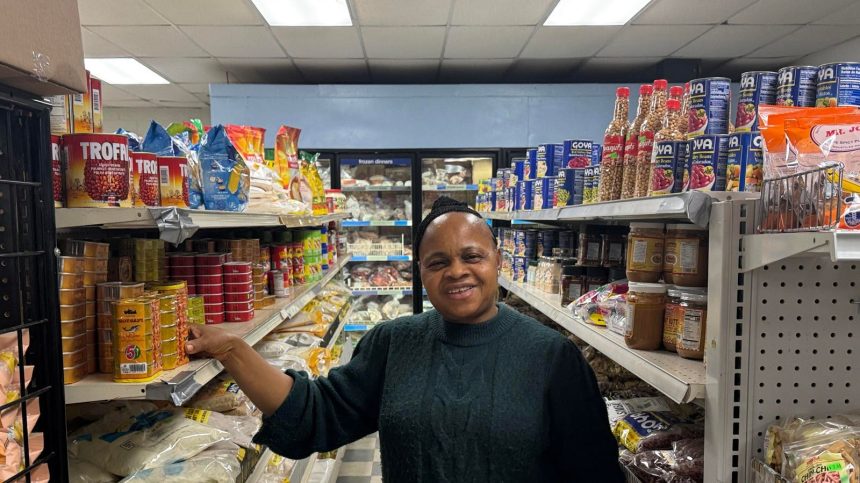Martha and John PeeWee, Liberian refugees who fled the ravages of civil war in 1997, have carved a unique niche for themselves in Grand Rapids, Michigan. Their unassuming storefront, Martha’s International Market, Inc., is more than just a grocery store; it’s a vibrant hub for African and Caribbean immigrants yearning for the familiar tastes of home and a gathering place for a displaced community. Driven by a relentless pursuit of the American dream, the PeeWees built their business from the ground up, transforming a meager $200 investment into a thriving enterprise that offers a diverse array of African staples, from Ghanaian yams and Nigerian habanero peppers to cassava leaves and fufu flour. Their journey is a testament to resilience, hard work, and the power of community.
Arriving in the U.S. with three children, the PeeWees faced the daunting challenge of rebuilding their lives in a new country. Martha worked as a nursing aide for a decade before a back injury forced her to seek alternative means of supporting her family, which had grown to include a fourth child born in the U.S. The 2008 financial crisis dealt another blow, leaving them without a home. Undeterred, Martha utilized her remaining $200 to purchase tilapia fish from Canada during a family visit. This small investment marked the nascent stages of what would become Martha’s International Market. Initially, Martha sold the fish and spices from their home and later from the trunk of her car, targeting African braiding salons in Grand Rapids. Her initial clientele consisted of close friends, and the business steadily expanded to include potato leaves, palm oil, and eventually, chicken. The growing demand necessitated a dedicated space, prompting Martha to secure a storefront.
The PeeWees’ path to entrepreneurship was paved with obstacles. John vividly recalls the early struggles of juggling factory jobs while trying to establish their fledgling business. They poured all their resources into the venture, eschewing loans and relying solely on their hard work and determination. Martha’s initial fear of taking out a loan, fueled by the possibility of failure and additional debt, led them down the path of self-funding. This decision, although initially born out of caution, resonated with the challenges faced by many Black entrepreneurs who often encounter systemic barriers when seeking traditional financing. According to a 2023 report by the Federal Reserve Banks, Black-owned startups are significantly more likely to rely on personal funds or assistance from family and friends due to the difficulties in securing external funding. This reliance on personal resources reflects a broader trend within minority-owned businesses, highlighting the disparities in access to capital.
The PeeWees’ perseverance paid off. Today, Martha’s International Market boasts a wide selection of African produce and products, sourced both locally and internationally. Freezers brimming with packaged habanero peppers, imported meats, and fresh vegetables testify to the store’s commitment to providing authentic African culinary experiences. The store has established partnerships with farmers and vendors across Africa, leveraging the increasing interconnectedness of the global market. While navigating the complexities of international sourcing, including lengthy shipping times of three to four months, the PeeWees remain dedicated to bringing the flavors of home to their customers. Their efforts have transformed Martha’s International Market into a cultural touchstone for African immigrants residing in the Midwest, offering not just groceries but a sense of belonging and community.
Beyond its function as a grocery store, Martha’s International Market serves as a vibrant community hub. The PeeWees’ emphasis on personal connection, knowing their customers by name, and fostering genuine relationships has created a welcoming atmosphere that extends beyond mere commercial transactions. The store is a place where people reconnect with friends and acquaintances, sharing news and experiences, reinforcing the sense of community that is so vital for immigrants far from home. This focus on building relationships has been instrumental in the store’s success, solidifying its reputation as more than just a place to shop but a vital link to a shared cultural heritage.
The PeeWees’ success story coincides with a broader trend of increasing global interest in African cuisine. Fueled by cultural exchange, travel, the popularity of Afrobeats music, and a growing appreciation for diverse culinary experiences, African food has gained significant traction in recent years. Platforms like Yelp and Google Trends indicate a surge in searches for African dishes, reflecting a growing curiosity and demand. The rising popularity of African food festivals and pop-up restaurants further underscores this trend, introducing a wider audience to the rich tapestry of flavors and ingredients that characterize African cuisine. This heightened interest translates to increased sales of African food products in mainstream grocery stores, providing further evidence of the expanding market. Martha’s International Market is well-positioned to capitalize on this burgeoning demand, attracting not only members of the African diaspora but also curious newcomers eager to explore new culinary horizons.
Martha and John PeeWee’s journey from refugees fleeing war-torn Liberia to successful entrepreneurs in the U.S. is a testament to their resilience, hard work, and unwavering commitment to their community. Martha’s International Market stands as a symbol of their triumph over adversity, a testament to the power of the American dream, and a vital hub for a thriving immigrant community. More than just a business, it is a testament to the enriching power of cultural exchange and the enduring human need for connection and belonging. The PeeWees have not only built a successful business, but they have also cultivated a sense of community, a home away from home for many seeking a taste of familiarity and a connection to their roots in a new land.



